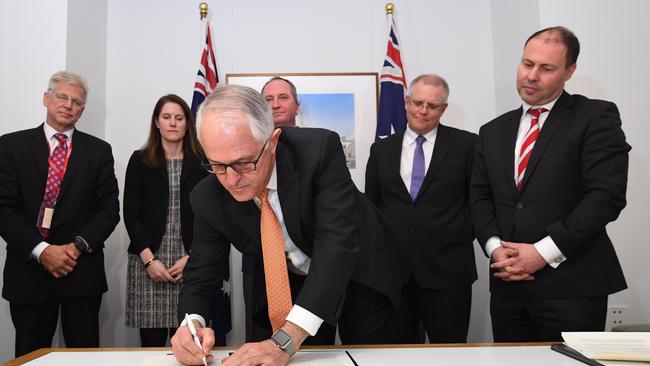Exporters promise to supply cheap domestic gas
East coast gas exporters have committed to provide reasonably priced gas to fill any short-term gas shortage.

East coast gas exporters have committed to provide reasonably-priced gas to fill any short-term gas shortage, avoiding federal government export controls next year.
The move comes as the Australian Industry Group says domestic contract gas price offers have fallen since the start of the year.
The east coast’s three export projects — represented by Santos, Shell and Origin Energy — have also agreed to provide the Australian Competition and Consumer Commission with details of domestic contract offers and agreements as they are made.
The commitment to fill any domestic gas shortfall with supply on reasonable terms, signed at a meeting with Malcolm Turnbull on Tuesday, was expected after an in-principle agreement struck last week between the Prime Minister and the gasbosses.
It means the Australian Domestic Gas Security Mechanism that would have restricted imports from the Santos-led Gladstone LNG plant will not be triggered for 2018, with the three exporters agreeing to fill a shortfall of up to 107 petajoules of gas forecast by the Australian Energy Market Operator last month.
“These commitments are vitally important to ensure Australian jobs and to ensure Australians have affordable and reliable energy and including electricity — gas being a more important fuel than ever in the generation of electricity,” Mr Turnbull said on Tuesday.
The deal drew cautious praise from Ai Group chief Innes Willox.
“Today’s gas agreement delivers breathing space to pursue medium-term plans to moderate demand and bring on new conventional, unconventional and import supply options as existing resources deplete,” Mr Willox said on Tuesday.
“If implemented as outlined ... the agreement should help avoid the looming supply crunch we’ve feared — for now.”
The industry spokesman said the big question was whether the opportunity would now be taken to ease state restrictions on onshore exploration and production, and whether prices would fall to export parity.
“Contract prices offered to gas users appear to have fallen from the highs of early 2017, but remain well above historic levels,” Mr Willox said.
“Energy users will be looking for further falls as more uncontracted gas is offered locally.”
Last week, Australian Competition and Consumer Commission chairman Rod Sims said east coast gas producers have recently been offering gas to commercial buyers at less than $10 a gigajoule, down from $10 to $16 for much of the year.
But this is still higher than the $7.77 a gigajoule the ACCC believes is an appropriate benchmark price.
The biggest winner from the agreement was Santos, with its GLNG project set to bear any restrictions under the ADGSM because it is the only one of the three Queensland LNG plants that sources gas from the domestic markets.
But after Mr Sims two weeks ago said targeting uncontracted LNG, of which GLNG has none, was the best way to restrict imports, Mr Turnbull pushed for a whole-of-industry response.
“We have always maintained that any shortfall required an industry response, rather than targeting an individual project,” a Santos spokeswoman said on Tuesday.
“We are planning to increase drilling activity in the Cooper Basin next year and will work with government and industry to see if more gas can be made available through better use of transport and storage.”
She said that without Queensland’s LNG projects, the gas to fix a supply issue that reflects declining Bass Strait production, increased demand after coal-fired power station closures and state restrictions would not be available.

To join the conversation, please log in. Don't have an account? Register
Join the conversation, you are commenting as Logout